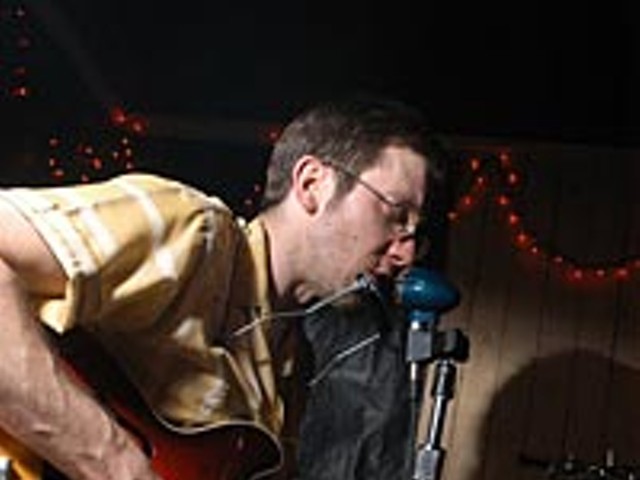Hey, you
What did I see
On a steamy morning after-haze?
Hey, me
What did you hear
As we slowly chipped the ice away it’s clear?
So begins the first chorus to the first song on the Brakemen’s first record, with Jon Milan’s ragged questions over an appropriately tattered setting of hard-strummed acoustic guitar, harder-hitting backbeats and B-3 organ. When Elvis Costello claimed writing about music is like dancing about architecture, this is what he was talking about. If these songs were buildings they would be crumbling, enormous structures, with each floor cluttered with nostalgic artifacts — images of road trips through the South and across the Plains, memories of old friends and foggy cities. If you were required to dance about those buildings, you’d have to string together steps of world-weary sophistication and composed desperation. See, it’s almost ridiculous.
But let’s start with some simple steps. Pianist Jon Milan and lyricist Rick Pinkerton — the songwriting force behind the Brakemen — started playing together when they were school kids on the ’skirts of Detroit in the ’70s. And they never stopped. They collaborated while in college at Eastern Michigan University (where Milan briefly studied classical piano) and continued writing together in a handful of Detroit bands over the next two decades. Think of the recently released 14 Songs By Milan and Pinkerton as a tangible product of the timeline, incorporating a well-seasoned cache of musical and real-life experience. 14 Songs finds the duo carefully choosing the favorite tricks of musical storytellers from the entire time span — putting the lessons of legends like Neil Young, Randy Newman and Dylan through a contemporary guise of soulful, narrative roots rock.
“We’re drawing on what we are inspired by — everything that we love, like Randy Newman, the Beatles, a lot of classics,” says Milan. “Songwriting as a craft is very important to us, but we draw a lot of personal history too.”
That history — stuff like the influence of Pinkerton’s Scottish immigrant parents or Milan’s father’s love of Jimmie Rodgers — peppers the songs just as much as their personal record collections.
Pinkerton agrees. “I don’t think you can avoid your own frame of reference. Part of you goes into your work if you’re working creatively. I think a lot of that album deals with interpersonal relations more than we had ever done before, and I was reflecting on it. So was he.”
Eventually you get used to Pinkerton and Milan speaking for each other like this. It makes sense; they’ve been doing it musically for three decades. Pinkerton speaks candidly about the real-life struggles behind the music: for his partner it was a recent divorce, for himself the imminent loss of an 11-year gig as a partner in Greektown’s soon-to-be-defunct Music Menu.
Pinkerton’s plight might seem a little lightweight on the page, but those of us who have been in the bar — those of us who really been in that bar — know better. Those of us who have killed a couple beers there after work or danced there, those of us who have sung along or chatted with friends, or sparked one up or gotten wasted, or been moved by its significant role in Detroit’s current musical heritage … we know better. The Music Menu won’t ever make Mojo’s hot list, or house fistfights between flavor-of-the-week candy asses, but it’s an institution of expression, in all its deeply, beautifully flawed majesty. It was one of the only downtown spots for jazz, blues, R ’n’ B and rock, and within weeks it will close its doors for good. Writing about that loss is just like dancing about architecture.
“It’s a very strange time in my life,” admits Pinkerton, who booked the musical acts that played the Menu. “On one hand I have this thing winding down at the Menu and I have this other thing — the band — winding up. I don’t think many people around [the Menu] really knew too much about this part of my life. But when people around here started finding out about it, they welcomed it with open arms.”
Whose open arms? Try a laundry list of Detroit’s household names like blues guitar luminary Johnnie Bassett, soul matriarch Thornetta Davis, Sponge’s Vinnie Dombrowski and the indomitable poet John Sinclair, all of whom make guest appearances in 14 Songs. Milan and Pinkerton also employ a rhythm section of ringers, with drummer Todd Glass and bassist John Dunn — both commonly seen on the Music Menu’s stage. Guitarists Lou Simon and Scott Clauser and keyboard whiz Phil Hale pump up the roster even more. But, thankfully it’s not just a studio project from a couple of well-connected songwriters. The Brakemen sound like a band. The guest spots seem more like jam sessions with buddies than high-powered cameos.
“It was a party feel,” Milan says. “Even though everyone wasn’t all together at the same time, people were in good spirits during the whole process. It wasn’t work at all.”
Pinkerton adds, “Because it was driven by the songwriting aspect of it, the people who came in to play on it were really there to serve the songs.”
So let’s talk about the songs. After the guitar-driven opener, 14 Songs stays mostly to a lean diet of tightly-arranged piano-based rockers. Take the third track, “Perfect World,” on which Spongeman Dombrowski lays down some brilliant Neil Diamondisms over a base of piano-rock starts and stops, or the poignant “Gates of Graceland,” a tune Pinkerton describes as being about “people who have burned up all their relationships, and people lost along the way.”
Highlighting every track of 14 Songs that has a heart-stopping moment of expression would be impossible — the disc spins with them from start to stop. But when the band stays to meat-and-potato ballads (“Wheatfields Burning,” “New Orleans, Grey Days”), it might be at its strongest.
Milan explains that “New Orleans, Grey Days” “came out of a visit to New Orleans when I was 17 years old. It’s a very important memory — because my expectations about the town’s history and culture were gone. Most of what I expected was gone. That germ that became jazz at the time isn’t there anymore. I don’t mean it in a derogatory way; there’s still great music down there. But there is a good part of the songs [on 14 Songs] that deal with the past remembered, the decay of that part of America.”
When the record strays from these straight-line rockers, the Brakemen wear the diversity of their influences on their sleeves. Listen to “Bela,” a rollicking, Eastern-European-flavored stomp dedicated to Béla Bartók (a person Milan describes as “an almost cartoonish figure in history”) that Milan has been massaging since 1979. Or absorb the gently swinging “Temporary People,” owner of the record’s most poetically tangible lyric: “We burn up friends/Just like matches/The intoxicating sulfur/Like a cocaine high.”
As the record plays on there are some key moments from the band’s friends that are equally immediate, like the brotherly repartee between Pinkerton and Johnnie Bassett on the blues-heavy “Blame it on the Weather,” or the reedy harmonies of Thornetta Davis and Nikki James on “Pouring Rain.” By the time it spins to a close with “We All Pass This Way,” a gospel-touched torch song that starts with a near-update to the Beatles’ “Hey Jude,” it’s apparent that the Brakemen have made a complete record. No matter how uncertain the journey has been, it’s reached something of a homecoming.
“When we come back to places that we once knew, so many of them are shadows of what they once were,” Milan says. “A lot of our work is about lost America — about what America was supposed to be and what it has turned into.”
It’s a comment that makes it hard not to think about the Music Menu, soon to become another structure on the long list of once-important Detroit music houses. Like the Gold Dollar. Like Motown. Like the Flame Showbar. It may be a bit of a stretch, but maybe the architecture of such places has bands like the Brakemen writing the sound tracks.
And, shit, let’s dance.
Milan and Pinkerton will be joined by bassist Daryl Lee, drummer Brian Harris, guitarist Scott Clauser and keyboardist Phil Hale on Thursday, March 4, at Small’s (10339 Conant, Hamtramck, 313-873-1117) with Lucas, Jeff Grand & the Grand Nationals and R.I.B. as a part of the Hamtramck Blowout.
Nate Cavalieri is an itinerant writer for Metro Times. E-mail [email protected]




